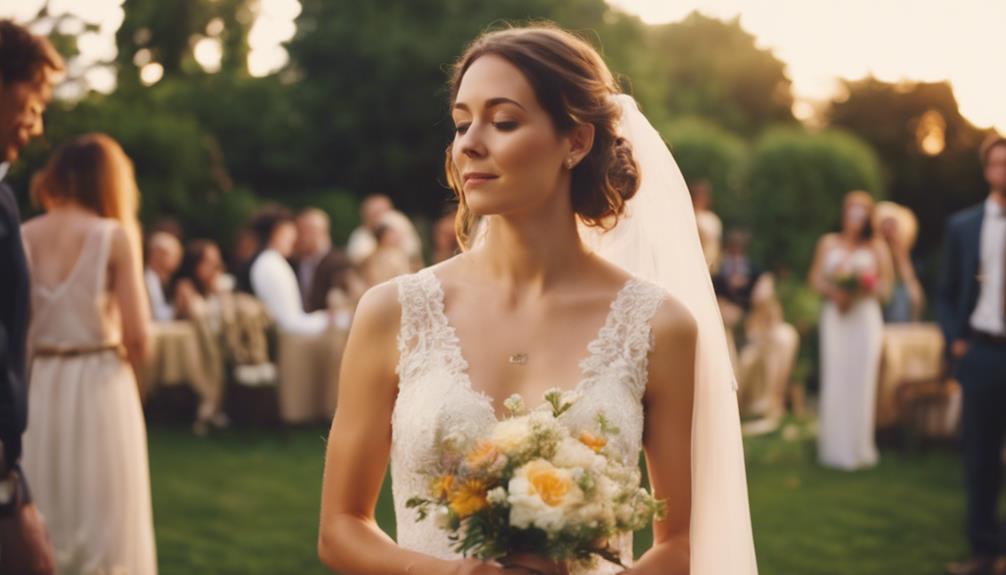You’ll find that the best age for women to get married is between 28 and 32 years. Marrying within this age range offers you a lower risk of divorce and greater stability. By your late 20s, you’ve likely gained emotional maturity and a better understanding of your own and your partner’s needs. Financial stability by this age reduces stress, and you probably have clearer life goals, enhancing compatibility. Women who marry after age 30 often report higher marital satisfaction. Discover more about how personal readiness and life experience factors into this ideal age range.
The Ideal Age Range

The ideal age range for women to get married is between 28 and 32, as this timeframe is associated with a lower risk of divorce and greater stability in marriage. Marrying later, particularly within this range, allows you to accumulate valuable life experience and emotional maturity, which can greatly contribute to a successful marriage.
Research indicates that women who marry in their early to mid-20s face higher divorce rates, whereas those who wait until their late 20s or early 30s experience more stable marriages.
By the time you reach your late 20s, you likely have a better grasp of what you want in a partner and a clearer understanding of your own needs and goals. This period often coincides with having made considerable strides in your education and career, providing a solid foundation for a partnership.
The best age to marry isn’t just about reducing divorce rates; it’s also about ensuring you’re emotionally mature enough to handle the complexities of a lifelong commitment.
Moreover, women marrying after the age of 30 often report higher levels of satisfaction in their marriages. This reflects the benefits of waiting until you’ve developed a strong sense of self and achieved a level of stability in your life.
Benefits of Marrying Later
Marrying in your late 20s to early 30s allows you to achieve greater emotional maturity and personal development, vital for a successful partnership. Waiting until this age range often results in higher marital satisfaction, as you gain a clearer understanding of your own needs and desires.
By marrying later, you can:
- Develop emotional maturity: You’ll be better equipped to handle conflicts and challenges.
- Achieve financial stability: A solid financial foundation reduces stress related to economic dependency.
- Enhance compatibility: You’ll likely have a stronger sense of self and life goals, improving partner compatibility.
Marrying later also allows you more time to explore your career and personal interests, which can contribute to a more balanced and fulfilling life.
This period of personal growth and self-discovery is essential for building a successful and lasting marriage. Furthermore, with greater emotional maturity, you’re more likely to navigate the complexities of marriage effectively.
Fundamentally, the benefits of marrying later encompass not just personal and financial stability but also improved relationship outcomes and long-term marital satisfaction.
Risks of Marrying Too Young

Getting married too young often leads to higher divorce rates and missed opportunities for personal growth. When you marry in your late teens or early twenties, you face significant risks, including a greater likelihood of divorce. Studies show that early marriage often comes with unrealistic expectations and a lack of maturity, making it harder to navigate the challenges of a lifelong partnership.
One of the major risks of early marriage is that you mightn’t yet fully understand your own identity or life goals. This lack of life experience can result in poor relationship choices. Financial instability is another common issue among young couples, and money problems frequently become a trigger for divorce. When you’re still figuring out your career and financial stability, adding the pressure of marriage can be overwhelming.
Moreover, the maturity required for making sound decisions in a marriage often develops around age 25. Marrying before this age can limit your personal growth and self-exploration, leading to regrets and dissatisfaction down the line. Early marriage can consequently close doors to experiences and opportunities that shape who you are, ultimately increasing the risk of divorce.
Factors Influencing the Right Age
Several key factors influence the best age for women to marry, including emotional maturity, financial stability, and life experience. These elements play a vital role in determining not just the timing, but also the quality and longevity of a marriage.
Emotional maturity: By the age of 28, many women have developed the emotional maturity necessary to handle the complexities of a marital relationship. This emotional growth helps in making better decisions and managing conflicts more effectively.
Financial stability: Financial stability often improves by the late 20s. A stable financial foundation reduces stress and provides a more secure environment for a marriage to thrive.
Life experience: Life experience accumulated by this age can lead to better understanding and compatibility with a partner, which greatly impacts marital satisfaction.
Reduced risk of divorce: Statistics show that women who marry between the ages of 28 and 32 have a lower risk of divorce within the first five years of marriage, as opposed to those who marry younger.
Considering these factors will help you identify the right age to marry, ultimately leading to a more fulfilling and lasting relationship.
Personal Readiness for Marriage

Personal readiness for marriage plays a significant role in determining the success and longevity of the relationship. Your personal readiness hinges on several key factors, including emotional maturity, financial security, and compatibility with your partner.
Emotional maturity tends to increase with age, making women in their late 20s to early 30s generally more prepared for the lifelong commitment that marriage entails. This maturity helps reduce the risk of divorce, as you’re better equipped to handle the ups and downs of a relationship.
Financial security is another important element of personal readiness. By your late 20s or early 30s, you’re more likely to have established a stable career, which can alleviate many of the financial stresses that can strain a marriage. This stability enables you to focus more on building a strong, healthy relationship.
Compatibility with your partner is also crucial. Longer courtships, which have become more common, give you the time to truly understand your partner’s values, habits, and life goals. This understanding improves your ability to assess whether you’re truly compatible, which is essential for a lasting marriage.
Personal readiness, then, is about more than just age; it’s about being truly prepared for the commitment of marriage.
Conclusion
Ultimately, the best age to get married is when you feel ready and confident in your decision.
Marrying between 28 and 32 offers a balance of personal and financial stability, reducing the risk of divorce.
However, don’t rush or delay just to fit a timeline.
Assess your own readiness, career goals, and personal growth.
Trust yourself to make the right choice when the time feels right for you.



